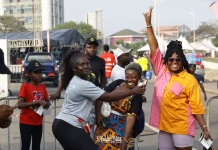
The National Coordinator of the District Road Improvement Programme (DRIP), Nii Lantey Vanderpuye, has taken a swipe at the Minority in Parliament, accusing them of rushing to make themselves relevant over the ongoing petition against the Chief Justice, Her Ladyship Gertrude Torkornoo.
His comments come in the wake of the Minority’s appeal to religious and traditional leaders to intervene and urge President John Dramani Mahama to halt the constitutional process concerning the Chief Justice.
The caucus maintained that the petition seeking her removal is baseless and does not meet the constitutional requirements.
Notwithstanding, Nii Lantey Vanderpuye dismissed the Minority’s calls, describing their reaction as predictable and driven by a desperate attempt to remain significant in the public space.
“I think that they are too much in haste to be relevant, because of their micro nature. They are too much in haste to make themselves heard.”
He specified that the constitutional process must be allowed to run its full course without interference. According to him, the nation’s laws provide clear guidelines for handling such matters, and political posturing must not disrupt due process.
“I will tell them to allow the constitutional process to engage itself fully, and when it has run its full toll, then we shall all know whether Chief Justice Torkornor has a case or not.”
While expressing some personal reservations, Vanderpuye stated that although he respects the Chief Justice, reports from within the judiciary suggest her image may not be as flawless as often portrayed.
“I have a lot of respect for the Chief Justice. Sometimes you see her and she portrays an angelic face, other times something else. The things some of us hear and some of the people like me have picked up from some of the people who are close to the judicial system will tell you that all that glitters is not gold.
“She is not as saintly as some of us have perceived her to be. I will not sit here and prejudge her, but I will give her the benefit of the doubt and sit here and believe that the things that I have heard about her and how she behaves were not true.”
Speaking on Channel One TV’s Breakfast Daily on Thursday, April 17, Vanderpuye further indicated that the Minority’s moves were expected and had already been factored into the government’s anticipation of the political terrain.
“What I want them to understand is that as soon as they start thinking, we have already thought about the steps they will take. Because they are very predictable and so they allow you to determine what action they will take in every instant.”
Read Also >>> Profile: Her Ladyship Justice Gertrude A.E.S. Torkornoo
Meanwhile, findings from a recent poll conducted by locally based research organisation Global InfoAnalytics show that a majority of Ghanaians support a petition seeking the removal of Her Ladyship Gertrude Araba Esaaba Sackey Torkornoo as Ghana’s Chief Justice.
The survey, conducted between April 7 and April 16, 2025, sampled 2,545 voters across all 16 regions of Ghana.
According to the findings, 52% of voters support the Chief Justice’s removal, while 20% oppose it. Additionally, 18% of respondents were neutral, and 10% expressed no opinion.
When those who opposed, were neutral, or had no opinion were asked whether they would support the removal if evidence of legal misconduct emerged, 30% indicated they would support it, while 35% remained opposed, 19% stayed neutral, and 16% still had no opinion.
The poll also highlighted regional variations in voter sentiment. In the Greater Accra Region, 58% of respondents supported the Chief Justice’s removal, compared to 16% who opposed it.
In the Central Region, 51% supported the move, while 16% opposed it. However, the Ahafo and Upper East regions were exceptions, where support for removal did not constitute a majority.https://www.facebook.com/plugins/post.php?href=https%3A%2F%2Fwww.facebook.com%2Fglobalinfoanalytics%2Fposts%2F1248190970646075&show_text=true&width=500
Educational background also played a role in shaping opinions. Among respondents with junior high school (JHS) education, 57% supported the removal, compared to 17% who opposed it.
For those with senior high school (SHS) education, 50% supported the move, while 21% opposed it. Among tertiary-educated respondents, 54% supported removal, while 18% opposed it.
Even among those without formal education, 37% supported the Chief Justice’s removal, while 30% opposed it.
Political affiliations, according to the findings, further influenced voter opinions. Among those who voted for John Dramani Mahama in the 2024 election, 79% supported the Chief Justice’s removal, while only 4% opposed it.
Conversely, among voters who supported Dr. Mahamudu Bawumia, 17% backed the removal, while 47% opposed it. For voters who supported other candidates, 38% were in favour, 19% opposed, and 23% remained neutral.
The poll underscores the complex dynamics of public opinion surrounding the Chief Justice’s role and highlights the influence of regional, educational, and political factors on voter sentiment.


















